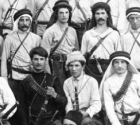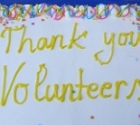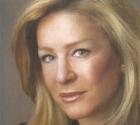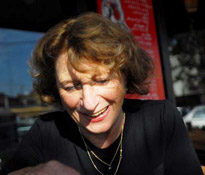
"Our" house, February 1959 Moshav Habonim, Zelda, Leon, Anthony & Sheba the dog.
In 1958, shortly after our arrival in Israel, my husband, Leon, and I and our sons aged 5 and 2 years old were invited to be candidates for membership at Moshav Habonim. We were happy to apply, since we had discovered that work was almost impossible to find.
Habonim was a moshav shitufi (cooperative) founded in 1950 by a group of ex Machalniks (overseas volunteers for the War of Independence), Israelis and survivors of the Holocaust from Europe. Most of the Machalniks were from English speaking countries and although they had no experience in agriculture, they were a great bunch of people. They were well-educated with many skills and would have been an asset to any cooperative or new enterprise but they had chosen this beautiful desolate spot overlooking the Mediterranean to realize their Zionism.
We arrived during a period of severe recession in Israel. The moshav was in deep crisis and their efforts at agriculture were less successful than the production of vermiculite made from sea shells, which was used for insulation and marketed to Turkey as well as other places in Israel.
This was the situation when my boys and I arrived, tired and hungry, to be welcomed by the general manager of the moshav, Phil Navon from South Africa and his wife Sylvia from London, who became our adoptive family.
The other family who looked after us were Lucy and Charlie Mandelstam. Lucy was the most elegant member of the moshav, a Holocaust survivor from Vienna. Her husband Charlie, also from South Africa was in charge of the work detail. I had a special rapport with Lucy, despite the fact that my husband was quite "sweet on her".
When Leon arrived at Habonim for his first interview, Lucy invited him for lunch. After lunch, which they ate with her three children, she said to Leon "Well, now we go to bed." He could not believe his ears. Only afterwards, when she explained that she meant "siesta" did he see the funny side.
I could only look at her and imagine how life must have been for her in Vienna and then in Auschwitz. I constantly compared her life to my own as a teenager in the UK during the war. However difficult it was, we were free and could adjust to the privations. I was determined to share with her everything I received from my folks during that time, and our families became very close.
My husband had started his own business in ladies’ fashions in London after we returned from our first stint in Israel in 1949, when he too was in Machal. He was experienced in dealing with workers and so was put in charge of the kibbutz melon fields where local Druse were employed alongside the members. I was sent to work in the children’s nursery, which I hated, much preferring to work in the fields.
At some point, I told friends that I was a hairdresser. I had prepared myself for aliyah by learning the latest hair cutting techniques at my cousin's salon, which was on a par with Vidal Sassoon. It was not long before word got around and the women came to me for a cut, style or permanent wave. It was suggested that I take one of the empty houses and set up a salon to cut hair, primarily for the men and the kids. At that time the members had to travel with their children to Haifa for haircuts, which was a costly exercise. When I suggested to Charlie that I do the hairdressing, he almost burst a blood vessel: "What, that’s work? This is a farming community. We can't afford such luxuries." After I explained how the moshav would benefit financially, he grudgingly agreed and we went ahead.
A decision had been taken to build a factory for canning sweet corn which we and neighboring kibbutzim were growing in abundance. Rudy, a refugee from the Nazis, who had escaped to the UK and from there had arrived in Israel with his wife Erna, was assigned to build and equip the factory. Rudy was brilliant; there was nothing he could not do.
Miraculously, Rudi constructed the factory from scrap metal, only spending money for equipment that had to conform to standards. Once the factory was up and running, it was decided that the only profitable way to run it was work shifts around the clock. Leon was put in charge of a shift. It was acknowledged that he was reliable and capable. Nothing was too much for Leon. He even gave up his Shabbat rests to work in the fields, while everyone else was relaxing with their families.
There were two more families on trial. One was a very sweet couple from England who insisted on bringing their car, which was taboo. They found it hard to acclimatize and left after a few months. The other family from South Africa were what could only be described as unfortunates, with mental and physical handicaps. It was obvious to all, that their families had seen Israel as "a way out". This was not unusual in those days and they had persuaded the Jewish Agency emissaries to send them over. They were encouraged to leave at some point.
Our family had been successfully absorbed, or so we thought. We had a great social life, loved every aspect of communal interaction, and our boys were also very happy and adjusted. We thought that we would never leave and that we had found the perfect life for ourselves, in spite of the simple, almost primitive conditions. We had a two-roomed house in which we slept on a couch bed in the living room, stored our shoes in orange crates, had a paraffin water heater outside the shower which invariably exploded, and loved it all.
The visitors we had in those days brought us instant coffee and other goodies which everyone enjoyed. That’s how it was then. Very few people came to visit because so few of us from Western countries had made aliyah.
As the day approached when the decision about whether we would be accepted for membership would be put to the vote, we heard rumors that there were people who were determined not to let us stay. Our friends, most of whom comprised the leadership of the moshav, would not believe it. One friend, an ex-South African businessman who was in charge of exports and all the commercial enterprises, told us, "If the Harris family is not accepted, then this is not a place I want to live in."
On the fateful day, Leon was far away in the fields with the workers. I was at home after my morning work and Monty, the secretary of the moshav, knocked on my door, his face ashen. I knew then that we had been rejected
He tried to console me by saying: "Tomorrow they will realize what a mean and evil thing has happened here and you will stand again and be accepted unanimously." My response was "no way." I was shattered. Leon could not be contacted and would be home only at dusk. I was alone.
Where were Charlie and Phil? I later learned that they had finished a bottle of whisky and they couldn't face me. No one could look us in the eye the following day. Of course, no one would admit who had voted against us, but we knew that 26 out of 50 families had. Tight-lipped I went about my work
In the evening, Leon and I with Charlie and Lucy talked about the options for the future. They were leaving in any case, as he had been appointed the first golf coach at Caesarea Golf Course. Although he had come to Israel as a sailor who had fought in the War of Independence and was a pioneering Zionist, Charlie was the only former golf champion in the country and this was an offer he could not refuse. They suggested that we move with them to Beit Yanai where they had rented a house. Leon decided that he would seek employment in the fashion business and looked up contacts.
Solly and many of the others who had founded Moshav Habonim eventually left to seek their fortunes elsewhere. They all found excellent jobs where their skills and talents could be appreciated, even though Habonim had been their home from the beginning.
As for us, we stayed in Israel and the rest is history.
Zelda Harris is well known in Israel as one of the most active Anglo immigrants living here. Her public life began in London as a founder of the Women's Campaign for Soviet Jewry in 1971. Here she was a joint founder, in 1971, of the Committee of Concerned Citizens, working for electoral reform. She spent many years as director of Bipac and was a founding member of Metuna, the road safety organization, in 1993. Leon died last year and one of her three sons died several years ago.
 DEAR EDITOR 153
DEAR EDITOR 153 REVISITING THE PAST BETH HASHOMER
REVISITING THE PAST BETH HASHOMER BIBLICAL ZOOS & ANIMAL RESERVES IN ISRAEL
BIBLICAL ZOOS & ANIMAL RESERVES IN ISRAEL A new website in English - on Volunteering - Launched in Israel
A new website in English - on Volunteering - Launched in Israel Help Needed for Abused Horses and Donkeys
Help Needed for Abused Horses and Donkeys Heather's Heseg
Heather's Heseg Zelda Harris
Zelda Harris